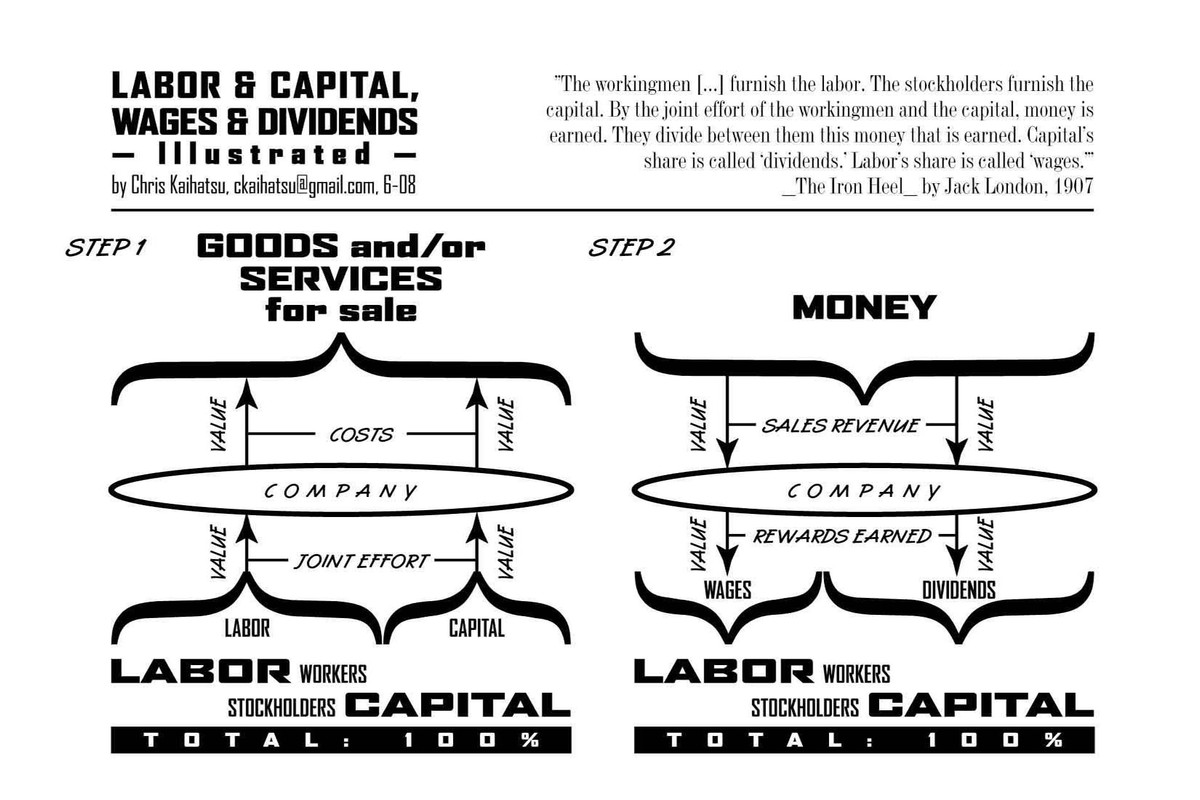ckaihatsu wrote:
I do understand the difference between sourcing costs and finished-good demand-price --
Truth To Power wrote:
No, you obviously don't. No Marxist can.
No, you're being too dismissive -- the difference is that between what a boss pays for labor-power from workers in wages, and the revenue received from the sale of those goods and services that those workers produced.
I have a schematic graphic illustration of these two components:
[11] Labor & Capital, Wages & Dividends
---
ckaihatsu wrote:
what's not explainable is why the 'middleman' person should enjoy the difference between these two valuations, however it may happen to fluctuate.
Truth To Power wrote:
It's easily explainable: they guessed right. As a Marxist, you can only see the profits of those who guess right, not the losses of those who guess wrong, so you think the profit is obtained in return for nothing.
And this is the crux of the philosophical / political difference -- revolutionaries like myself say that this 'guess' or 'estimation' of future market conditions is *insufficient* as a social function to merit the kinds of rewards that are typically paid-out for this financial role.
So, yes, the capitalist is providing liquidity to those enterprises that would benefit from leveraging such lent additional capital, and the winning capitalist has also 'bet' correctly, on the best 'ponies', so-to-speak. But when workers are seeing their wages and benefits cut, are being laid-off, are having to pay with their livelihoods and even lives, for the sake of this income inequality that benefits the already-wealthy, then there's a vast difference of opinion there, based on empirical conflicting class interests.
---
ckaihatsu wrote:
The capitalist has added *some* value in facilitating the organizational ('private') process of manufacturing, but the capitalist benefits from that resulting discrepancy between costs and sales,
Truth To Power wrote:
Because he is helping to REDUCE the discrepancy between what exists and what people want.
Well, yes, I've already *acknowledged* this fact under capitalism ('social organization').
What's at-issue, though, as I just outlined, is whether the *rewards* for that financial role in the societal productive process -- as distinct from the actual *manufacturing* / provision of the goods and services commodities themselves, by the wage-workers -- are really accurately proportional to its proportional role in the overall process of commodity-production. When financiers are masters-of-the-universe while working families are struggling over getting the basics of day-to-day living, something's not right there.
---
ckaihatsu wrote:
and especially so if that market segment has been cartelized, oligopolized, or monopolized.
Truth To Power wrote:
To the extent that privilege has been added to the conditions of exchange, it is obviously no longer a free market process, so we can't explain the results by reference to the market.
But the point here is that the 'free market' ideal is just that -- an *ideal*. In the real world, the provisioning of finance capital takes place in a 'meatspace' social reality, ultimately, so the prevailing social reality (culture) *will* have a tangible effect on financial participants.
Just by 'market' dynamics alone we can see that financial participants have a *social*, market-type *incentive* *to* organize for their own private class interests, and hence we have the bourgeois government apparatus that roundly favors the interests of capital through its monopolization of physical force and violence, under 'law'.
So the 'free market' principle includes not just private interests in the marketplace, but also in society, which, on the whole, has to *uphold* the social institution / practice of 'currency value', exchange values, 'markets', 'finance', etc., through its laws and use of physical force.
---
ckaihatsu wrote:
In other words the capitalist benefits greatly simply by restricting supply artificially,
Truth To Power wrote:
The capitalist qua capitalist has no power to do any such thing. Only privilege can.
But don't you see -- the capitalist *enjoys* the privilege of state-sanctioned market-based economics, including the private accumulation of wealth.
With this right / privilege comes the *social* right / privilege to organize economically in whatever ways they find to be advantageous (within some mild limits), so today we have *corporations* that have more legal rights than people do, and that span continents with 'internal' freedoms for the intra-transfers of capital while people themselves have no such rights to cross national borders in search of working-type economic opportunities like better-paying jobs.
---
ckaihatsu wrote:
so as to stoke demand, if at all possible.
Truth To Power wrote:
The extent to which demand can be increased artificially through advertising is an open question. Certainly it has some effect. But where do you draw the line between exercising free speech and annoying or manipulating people?
Well, more-to-the-point is that advertising media channels go to the highest bidder, since television bandwidth (so-called 'public airwaves') functions as private property.
---
ckaihatsu wrote:
These kinds of artificial market manipulations add *zero* to the production process and do nothing for underlying utility / use values of the end product.
Truth To Power wrote:
Not so. The idea of advertising is to increase the perceived utility of the product. Marxists just think they know better than consumers what the latter want, or at least should want.
Actually, I wasn't referring to the corporate media, I was referencing the terrain of private-interest competitive space / arenas / dynamics -- your 'free market' ideology is oblivious to inter-capitalist turf wars, like the two world wars of the 20th century.
By ignoring the *political* and myopically focusing on the *economic*, you're unable to address the impact that *political* factors have on the economic / financial realm, which makes your 'free market' line into a fantasy of ideology, since it's unrealistic. As long as private capital interests exist, they'll need the bourgeois government apparatus to uphold their social practices of market exchanges, through the use of the police, military, etc.
---
ckaihatsu wrote:
You're mixing apples-and-oranges -- class pertains to *control* of a society's productive processes, while what you're describing is the difference between rentier capital ('landowner'), and equity capital ('factory owner').
Truth To Power wrote:
No. Class pertains to who is privileged over others: i.e., who is entitled by law to benefit from the violation or removal of others' rights.
Okay, now this is sounding more accurate -- my position is that the *bourgeoisie* (private property owners) of the world are entitled, by prevailing law and its enforcement by police, military, etc., to the rights of private property ownership, over the rights of workers / people for humane living and working conditions because the latter would often require a *diminishing* of private property rights / privileges.
I don't know if you're trying to be evasive over this definition, but, yes, 'class' implies / indicates 'privilege' -- the privilege of elitist private property ownership and usage, versus the rights of regular-people over the control of their own lives when such personal interests inevitably come into conflict with the rights of private property ownership.
---
ckaihatsu wrote:
In Marxist / empirical terms, there's no 'contributor class' (a definitional mixing of the counterposed interests of factory owner and workers, respectively), and there's no 'taker class' (of rentier-capital).
Truth To Power wrote:
No. In empirical terms, contributor and non-contributor are the classes that actually exist as a matter of objective physical fact. The interests of factory owners and workers are not counterposed any more than the interests of bakers and bread buyers. Marxism just ignores the empirical physical fact of contribution vs non-contribution.
I disagree, and I'll be glad to explain it further, but first you'll need to clarify what you mean by 'contribution' (to the commodity-productive process), as distinct from 'non-contribution'.
I *agree* (as I've said before, in past exchanges) that rentier capital is *non-productive*, economically. And, yes, equity capital *does* provide inputs to the capitalist commodity-production process, but the political discrepancy here is over *what rewards* this equity-capital participation merits. As things are equity capital (and rentier capital) are rewarded *disproportionately* in relation to actual proletarian work inputs, work that actually physically produces the goods and services commodities under capitalism.
Rentier-capital ownership and equity-capital ownership, respectively, are *not* 'classes' -- they are *factions of capital ownership*.
---
ckaihatsu wrote:
You're off on your repeated rant / position of equity-capital-over-rentier-capital,
Truth To Power wrote:
No, contribution vs extraction. As a Marxist, you just can't tell the difference.
Let me put it *this* way -- to *your* worldview the rentier-capital aspect of capitalism is far more *political* -- you obviously favor *equity* capital for its relative historical economic progressivism, but you're blind to the reality that capitalism relies on *both* rentier capital ownership (land, etc. -- non-productive assets of financial value), and also on equity capital accumulations that can facilitate the commodity-productive process of modern capitalism, through the exploitation of wage labor.
Yes, a commodity-production enterprise like McDonald's seems 'independent' and 'dynamic' in what it does, producing hamburgers for customers, but capitalism also requires the rentier-type *real estate* component underneath the McDonald's franchise, so as to formally parcel-out who-does-what-and-where. This is more of the 'referee', 'governmental', 'regulatory' aspect of capitalism, which you abhor, while also completely ignoring the actual labor-productivity of the working class altogether.
---
ckaihatsu wrote:
which is understandable, but along the way you're misusing the term 'class', which conventionally indicates which interests control the productive process, through capitalism's component of private property ownership, whether that's rentier capital and/or equity capital.
Truth To Power wrote:
"Conventionally"? You mean by Marxist convention, which is wrong. The people who really control the productive process are managers, who are just hired employees. The landowner doesn't control or contribute to the productive process; he only takes a portion of production in return for no contribution to production, a role he could satisfy just as well while comatose. The provider of production goods only controls the production process to the extent that he decides what sort of production to enable through his contribution. The process itself is still controlled by hired managers. So Marxist class "analysis" puts the landowner in the same non-controlling class as the low-level hired worker, and calls the hired manager a capitalist even though he may have no capital invested in the firm. So it's just stupid, worthless garbage.
No, this is a blatant *misrepresentation* of the Marxist line / analysis -- Marxism does *not* lump ownership-created management roles in with the hired, *productive* worker.
Management roles are *salaried*, and the compensation is often tied-into ownership-type rewards like profit-sharing, bonuses, incentives, etc., that are gauged to the growth of the company itself.
This economic fact itself makes the management role / position distinctly different from the position of the wage worker, since wages are *not* indexed to the economic growth of the company.
Management roles *politically* represent the interests of ownership, even if the manager may not own capital him- or herself.














 - By wat0n
- By wat0n